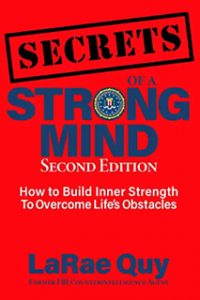One of the first things my firearms instructor at the FBI Academy told me that the best shooters are those who can stomp out the noise—both external and internal distractions—so they can focus on the scene in front of them. All I needed to do was relax, breathe, and focus.
I thought that was a rather milquetoast response. I wanted specific, detailed instructions on how to get a perfect score!
I immediately engaged in a continuous internal dialogue about the instructor’s wimpy advice as I felt the stress to qualify in firearms. From the 60 yard line, I shot 12 rounds and saw several black spots on my paper target. Filled with pride, I ran down the range, after we’d holstered our weapons, to find…those black spots were actually flecks of mud where I’d shot into the bern instead of the paper target!
Ugh. What was it the instructor said again?
Little did I know then but shooting a weapon at a target can be a Zen moment. If your mind is cluttered with thoughts and anxiety, you won’t hit your mark. Good shooters let all of that go and become very mindful.
Shooting a gun shares many of the same characteristics of meditation. Both require the person to control their noisy inner world with a strength of mind that produces mental toughness. We spend great swaths of our day ruminating over the many ways that society has failed to recognize our genius, or fantasizing about the love of our life, or rehearsing a political rant so poignant that our pig-headed neighbor will suddenly see the error of their thinking.
This great unspooling of our mind gets in the way of our ability to control the daily tyranny of our internal thought processes—compulsive, brain-driven, and unproductive behavior that is based on years of bad habits.
Meditation is the ability to train your mind to focus and redirect your thoughts. In the process, it can reduce your stress because your mind has let go—if only for a few moments—of the fight-or-flight responses which are ancient instincts we all have to either run from perceived danger or to take on the battle.
Sure, the stress is real, and the problem won’t automatically disappear or change because of meditation, but your ability to focus and redirect your thoughts puts your thinking brain in control, not your unpredictable emotional brain.
Many of us dwell on negative things when we’re alone. Left in silence, our inner drama queen can rear its ugly head as our mind begins an internal dialogue that can leave us sleepless and exhausted.
Here are 4 remarkable ways that meditation creates a strong mind:
1. Controls Anxiety and Stress
The FBI Academy taught me that there are many ways to experience terror, and in their dry little hearts, my instructors took every opportunity to expose me to many of them. If I failed to score above a 90% on my firearms qualifying tests, I would be dismissed from the Academy. No pressure on me, folks.
I learned how to shut out the noise from the other shooters and blur my vision to where I only saw the tip of the gun’s site as I held a steady grip and fired. My anxiety lessened and I was better able to cope with the stress.
Science can show us how and why.
Researchers explain that there are many “centers” in the brain, but the one that impacts the way you see yourself, and others, is called the Self-Referencing Center.
Many people also call this the “Me Center” because it processes information related to us—our daydreams, thoughts about the future, our performance, and our experiences.
When you become anxious and stressed, it triggers a strong reaction in your Me Center which leaves you feeling threatened and scared. This is where the fight-or-fight response wants to take over.
Meditation weakens this neural connection. Your ability to ignore anxiety and reduce stress is enhanced as these connections are broken. As a result, you are readily able to recognize sensations like anxiety or fear for what they are; in doing so, you can respond to them more rationally.
How To Make It Work For You: Research suggests that a combination of meditation and physical exercise—like running, yoga or tai chi—can be the most effective in reducing anxiety and stress.
2. Changes Your Brain
Scientists have learned that activities like meditation can change our brain in several ways. According to the research, meditation creates synaptic connections that thicken the brain tissues over time in the regions handling control of attention and sensory awareness.
This is important because it enables you to develop a greater understanding of yourself and how you relate to others. You’re better able to recognize thoughts and patterns of behavior that may be harmful or self-defeating.
Meditation also increases the production of serotonin, the neurotransmitter that helps regulate mood and sleep. Along with the enhanced ability to control or redirect racing and runaway thoughts at night, a regular meditation program can help reduce insomnia.
How To Make It Work For You: Try different meditation techniques because they are not a one-size-fits-all approach. Your brain will offer feedback on best practices that help you relax and control runaway thoughts, one of the biggest triggers for anxiety, stress, and insomnia.
3. Enhances Productivity
Meditation enables us to move from higher frequency brain waves—which reflect hyperactivity in the brain—to lower frequency. The slower the rhythms in the brain, the more time you have between thoughts. With more time, you also have more opportunity to skillfully choose which thoughts you should invest in.
When you practice how to focus your mind, it helps increase the strength and endurance of your attention span. You also enhance your ability to reverse patterns in your brain that contribute to mind-wandering, anxiety, and loss of attention.
How To Make It Work For You: Forget about packing yet another activity in your already busy day. However, meditating for a short period of time each day, and/or at different times during the day, can offer worthwhile benefits.
4. Calms You Down
While many may say that meditating for performance is not the point, researchers at the University of California, Santa Barbara, have discovered that meditation not only reduces stress, but it also calms us down so we can be our best.
Meditation does the following:
- Separates the noise from the static.
- Helps you focus on what is important to you.
- Increases memory so it’s easier to recall information.
- Creates better conversations with others.
- Strengthens resolve to make intentional decisions so you achieve what you want.
- Trains your mind to not get swept up by distractions.
Meditation is the extra edge most of us need for peak performance in our competitive environments. It helps us to control our mind’s natural inclination to wander, which often gets in the way of our success. A strong mind is distracted less often and has an easier time remembering what is important to remember.
How To Make It Work For You: Meditation gives your mind the tools to be strong and in control. A regular practice allows you to be an active participant in your life, and not a passive observer.
You should sit in meditation for twenty minutes a day, unless you are too busy. Then you should sit for an hour—Zen Proverb
© 2021 LaRae Quy. All rights reserved.
You can follow me on Twitter, Facebook, Instagram, AND LinkedIn
Are you mentally tough? Here is my FREE Mental Toughness Assessment
Check out my new online training program at www.SecretsOfAStrongMind.com
Get my new book, “Secrets of a Strong Mind (second edition): How To Build Inner Strength To Overcome Life’s Obstacles”
Author of “Mental Toughness for Women Leaders: 52 Tips To Recognize and Utilize Your Greatest Strengths”






You make such great points about the power of meditation, LaRae! I have found meditation keeps me calm, as you suggest when everything around me seems out of control. When I just listen to my breathing it blocks out any other negative thoughts so I just feel so at ease. I also think that meditation helps me keep a clear and focused mind and helps me stay clear of feeling paralyzed. Love your FBI stories too!